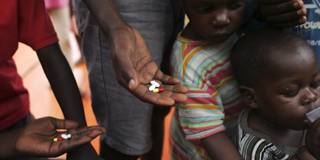The global focus on ending AIDS, tuberculosis, and malaria by 2030 has proven tremendously effective in rapidly scaling up access to treatment in developing countries. But if the world is to meet these ambitious goals, national governments and international development institutions must work together to build stronger health systems.
PARIS – As part of the United Nations Agenda for Sustainable Development, the international community set itself the ambitious goal of eradicating HIV, tuberculosis, and malaria by 2030. Despite the extraordinary progress that has already been made, ending these pandemics and achieving the broader goal of ensuring the health and wellbeing of all will require ramping up efforts to support countries in building resilient and inclusive health systems.

PARIS – As part of the United Nations Agenda for Sustainable Development, the international community set itself the ambitious goal of eradicating HIV, tuberculosis, and malaria by 2030. Despite the extraordinary progress that has already been made, ending these pandemics and achieving the broader goal of ensuring the health and wellbeing of all will require ramping up efforts to support countries in building resilient and inclusive health systems.